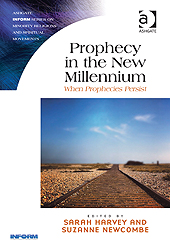Prophecy in the New Millennium: When Prophecies Persist

Prophecy in the New Millennium: When Prophecies Persist
Sarah Harvey and Suzanne Newcombe, Inform, UK, eds.
Ashgate Inform Series on Minority Religions and Spiritual Movements 2013
Secular and spiritual prophets of doom abound in the information-rich twenty-first century – as they have for millennia. But there has yet to be worldwide floods, meteor impact, global computer failure, obvious alien contact, or direct intervention from God to end the world as we know it. Considering the frequency with which prophecy apparently fails, why do prophecies continue to be made, and what social functions do they serve?
This volume gives a concise, but comprehensive, overview of the rich diversity of prophecy, its role in major world religions as well as in new religions and alternative spiritualties, its social dynamics and its impact on individuals’ lives. Academic analyses are complimented with contextualized primary source testimonies of those who live and have lived within a prophetic framework. The book argues that the key to understanding the more dramatic, apocalyptic and millenarian aspects of prophecy is in appreciating prophecy’s more mundane manifestations and its role in providing meaning and motivation in everyday life.
Contents: From the extraordinary to the ordinary: an overview of prophecy, Suzanne Newcombe and Sarah Harvey; Part I Perspectives on Prophecy: Messages from beyond: prophecy in the contemporary world, Michael Barkun; Prophecy: social scientific perspectives and Lubavitch, Simon Dein; Prophecy on the margins: a case study of the Apocalypse in later 17th-century England, Warren Johnston; Prophecy: a perspective from the early Church and the contemporary experience of a Methodist minister, Andrew Maguire. Part II Perennial Prophecy in Mainstream Traditions: The new Apostolic reformation: Main Street mystics and everyday prophets, Margaret M. Poloma and Matthew T. Lee; The Mahdi and the end-times in Islam, Hugh Beattie; The coming Golden Age: on prophecy in Hinduism, Luis González-Reimann; Divination, prophecy and oracles in Tibetan Buddhism, Christopher Bell; Chasing the horizon: prophecy in secular contexts, Wendy M. Grossman. Part III Contemporary Case Studies: Living in the time of the end: a personal commentary from my experiences with the Children of God and The Family International, Abi Freeman May; Mormonism and The Family International: toward a theory of prophecy in the development of new religious movements, Gordon Shepherd and Gary Shepherd; The dispensation of providence: growing up as a blessed child in the Unification Church, Hani Zaccarelli; Waco: living prophecy, Livingstone Fagan; (Always) living in the end-times: the ‘rolling prophecy’ of the conspiracy milieu, David G. Robertson. Part IV 2012 Prophecies: From mushrooms to the stars: 2012 and the Apocalypse milieu, Andrew Fergus Wilson; Viral email and the 2012 Apocalypse contagion: seven reasons why the world won’t end in 2012, Kristine Larsen; Remembering the future: 2012 as planetary transition, Suzanne Rough; 2012 and the revival of the New Age movement: the Mayan calendar and the cultic milieu in Switzerland, Jean-François Mayer. Conclusion: Looking into the future: why prophecies will persist, J. Gordon Melton; Index.
About the Editors:
Sarah Harvey, MSc is a Research Officer at Inform where she has worked since 2001. She has an undergraduate degree from the University of Manchester in Comparative Religion and Social Anthropology and a Masters degree from the London School of Economics and Political Science in Social Research Methods (Sociology). She is also currently a PhD student at the University of Kent researching the natural childbirth movement. At Inform, her research focuses on Pagan religions, new Christian movements, the ‘new age’ milieu and 2012 prophecies. She has recently guest edited a special issue of The Pomegranate: The International Journal of Pagan Studies.
Dr. Suzanne Newcombe is a Research Officer at Inform where she has worked since 2002. She is also an Associate Lecturer for the Open University in the East of England and has lectured in the field of new and alternative religious movements at Kingston University. Her PhD research at the University of Cambridge explored the popularization and development of yoga and Ayurvedic medicine in Britain. She continues to be active in research networks in this area and has published articles in the Journal of Contemporary Religion, Religion Compass and Asian Medicine, as well as contributing chapters to a number of edited books.
Reviews: ‘This is a rich text full of significant insights for both new comers to the field of study and established experts. Uniquely combining the views of scholars and participants in prophetic movements, the essays in this volume make important contributions to our theoretical and empirical grasp of why and how prophecies generate, sustain, and sometimes strain religious movements, ranging from the lengthy legacy of Christian apocalypticism to the recent preoccupation with the Mayan 2012 prophecy and many other contemporary revelations.’ – Lorne Dawson, University of Waterloo, Canada
‘Seasoned scholars are joined by new researchers in this rich and lively collection. Coverage is broad and comparative, chapters are written in an accessible yet scholarly style, and a sure editorial hand is evident throughout. The volume as a whole makes a persuasive case for restoring prophecy to a central place within the comparative study of religion.’ – Steven J. Sutcliffe, University of Edinburgh, UK